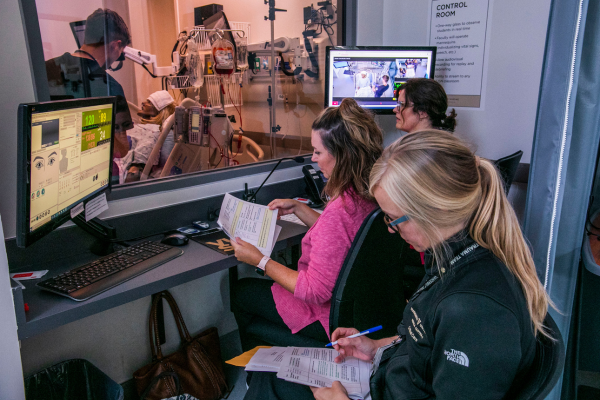 The Vanderbilt University School of Nursing was awarded a Health Resources and Services Administration Bureau of Health Workforce grant to create its new Nurse Education, Practice, Quality and Retention Simulation Education Training Program.
The Vanderbilt University School of Nursing was awarded a Health Resources and Services Administration Bureau of Health Workforce grant to create its new Nurse Education, Practice, Quality and Retention Simulation Education Training Program.
The three-year, $1.5 million grant, funded by the Department of Health and Human Services, will allow the School of Nursing to expand simulation offerings for students, faculty and other health professionals. The school will use the grant to expand its simulation lab with four additional outpatient rooms; launch a three-day, annual interprofessional simulation academy for health professionals; train 200 students from nursing, pharmacy, medicine and divinity programs per year; create a simulation micro-credential program for faculty; and support faculty simulation certification. The funding is part of HRSA’s Nurse Education, Practice, Quality and Retention Grant program.
“While we have a strong inpatient nursing care simulation center, we recognized that our offerings did not sufficiently cover the nuances of ambulatory or outpatient settings,” said Assistant Professor Jo Ellen Holt, DNP, Skills and Simulation Lab director and simulation faculty lead. “Those environments present unique challenges and learning opportunities that are distinct from inpatient care, as they require different patient interaction protocols, follow-up procedures and care coordination. Expanding our simulations to include these settings ensures that our students are well-equipped to deliver high-quality care across the full spectrum of clinical environments.”
Experience in outpatient and ambulatory care environments aligns with VUSN’s continued emphasis on preparing advanced practice nurses to provide much-needed care in rural and medically underserved settings.
The improvements and additions will enhance nursing education by improving faculty skills, knowledge and use of simulation, as well as by increasing educational opportunities for nursing students, all of which will increase the number of nursing graduates who can help rural and/or medically underserved populations. The grant will also increase support of interprofessional education.
“Vanderbilt School of Nursing’s commitment to interprofessional education is part of our approach to health care delivery,” explained Associate Professor Christian Ketel, DNP’14, FNAP, who serves as project director. “This is why we’ve extended training to include not just the nursing profession, but also medicine, pharmacy and even divinity. In addition to providing direct outpatient simulations for students, we are developing resources for faculty in other disciplines as well. The new Simulation Education Academy will enhance the abilities of health education faculty in simulation-based teaching.”
The project team also includes VUSN Dean Pam Jeffries, PhD, FAAN, ANEF, FSSH; Professors Angela McNelis, PhD, RN, FAAN, ANEF; Ruth Kleinpell, PhD, FAAN, FAANP, FNAP, MCCM; and Cathy Maxwell, PhD’12, FAAN; Associate Professors Mary Lauren Pfieffer, MSN’11, DNP; and Carrie Plummer, MSN’05, PhD; Assistant Professors Julia Steed, PhD’18, MSN’10; and Jessica Walker, DNP’17, PMC’17, MSN’15; and consultant Kristin Thomas Dreifuerst.
“The HRSA grant’s focus on innovative educational interventions and building a health care workforce for medically underserved communities resonated with the work we are already doing,” Holt said, referring to the Vanderbilt School of Nursing’s numerous HRSA grants benefiting people in low-income or rural communities.
Other School of Nursing HRSA-funded projects that support preparing graduates for work with rural or underserved communities include nurse residency programs, expanded clinical education programs for nurse practitioner and nurse-midwifery students, a sexual assault nurse examiner program, and behavioral health education tailored for practitioners working with rural and medically underserved populations.
The Nurse Education, Practice, Quality and Retention Simulation Education Training Program is supported by the Health Resources and Services Administration (HRSA) of the U.S. Department of Health and Human Services (HHS) under grant number 1 T48HP52038‐01‐00 as part of an award totaling $500,000 with 0% financed with non-governmental sources. The contents are those of the author(s) and do not necessarily represent the official views of, nor an endorsement, by HRSA, HHS, or the U.S. Government. For more information, please visit HRSA.gov.